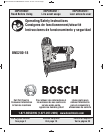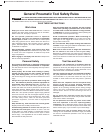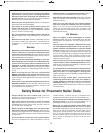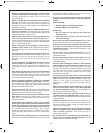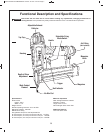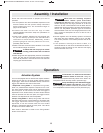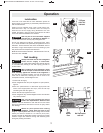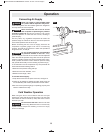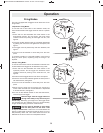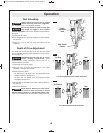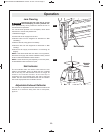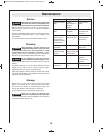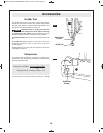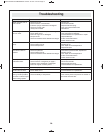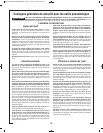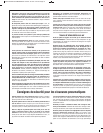
4.
Follow all recommendations for sizes of hoses, fittings
and other compressed air accessories. Improperly sized
or fitting components may result in the risk of injury or
property damage.
Check air supply lines for restrictions before adjusting
the tool. Air volume is as important as air pressure.
Restricted air flow will prevent the tool from operating as
designed, resulting in slow operation, nail misfeeding or
reduced driving power.
Always load nails into the tool's magazine before the air
supply is connected. Connecting the air supply after
loading nails reduces the risk of unintentionally driving a nail
and injuring yourself or someone else.
When loading nails ensure that nails are parallel with
nose of tool and the nail tips contact the wear rail. If
nails are not loaded properly the tool will misfire and nails
can be deflected, cause the tool to react in an unexpected
manner, and damage the tool.
When loading the tool's magazine, check that the
magazine is fully closed. If the magazine does not latch in
the closed position, the tool will misfire and nails can be
deflected.
Use only the nails meeting the criteria listed in the
“Specification” section of this manual. Nails not
identified for use with this tool can cause the tool to
malfunction and result in the risk of injury and/or tool
damage.
Do not connect the air supply when the trigger or work
contact element is depressed. Keep the tool pointed
downward, away from yourself and bystanders when
connecting the hose to reduce the risk of accidental nail
firing.
Keep hands and feet away from work contact element
of the tool during use. Never place your hands or feet
closer than 8 inches (200 mm) to the work contact element
of the tool. Nails can be deflected by the work piece or
driven away from the point of entry.
Choice of triggering methods is important; understand
the operating characteristics of each option. There are
two possible firing modes; “sequential firing” and “bump
firing.” Read and understand section titled “Actuation
Systems” for details of each mode.
Do not use a frozen tool. Allow tool to thaw before using.
Moisture frozen in the tool may impede internal components
resulting in the risk of injury and/or tool damage.
Operate the tool only when properly positioned on the
work piece. If the tool is not held properly on the work
piece the nail can be deflected or the tool can react in an
unexpected manner.
Use sufficient grip to maintain control of the tool while
allowing tool to recoil away from work surface as nail is
driven. Do not attempt to prevent the recoil by holding
the tool with excessive force against the work piece.
The tool will recoil as the nail is driven. This is normal
function for the tool. Restriction to the recoil can result in
second nail being driven when the tool is in “bump firing”
mode.
Use caution when operating the tool in confined areas.
If the work contact element is allowed to re-contact the work
surface before trigger is released, an unwanted nail will be
fired if the tool is set in “bump firing” mode.
In order to avoid undesirable double fire, take the
following actions when the tool is in the following firing
modes:
Sequential firing:
1. Ensure trigger is in sequential fire mode.
2. Pull the trigger firmly and release.
Bump firing:
1.Do not press the tool against the wood with
excessive force.
2.Allow the tool to separate from the wood as it
recoils after nailing.
Never drive nails near flammable materials. Some types
of nails can spark out of the nose during driving operation.
Know what is behind your work piece. Do not fire nails
into walls or floors without assuring the area on the
opposite side is clear. A nail could travel through the work
piece, striking someone.
Do not drive a nail on top of another nail. This could
cause the nail to be deflected or the tool to react in an
unexpected manner.
Do not attempt to drive nails at a steep angle. This could
cause the nail to be deflected or the tool to react in an
unexpected manner.
Use care when nailing thin material or when working
near the edges and corners of the work piece. Nails may
drive through or away from the work piece and injure
yourself or someone else. Be aware that the nail may follow
the grain of the wood causing it to protrude unexpectedly
from the side of the work material. Drive the nails
perpendicular to the grain.
Do not drive nails into walls, floors or other work areas
without knowing what may be damaged by the driven
nails. Nails driven into live electrical wires, plumbing, gas
piping, or other types of obstructions can result in
electrocution, explosion, personal injury and/or property
damage.
Make sure the pressure of the compressor is adjusted
so that nails are driven flush into the work piece and
not pushed completely through. The correct pressure is
the lowest pressure that will do the job.
Keep face and body parts away from back of the top
cap when working in restricted areas. Sudden recoil can
result in impact to the body especially when nailing into hard
or dense material.
Handle tool carefully. Because of high air pressure in the
tool, do not drop the tool or strike the tool against hard
surfaces; and do not scratch, stamp, nor engrave signs on
the tool. The tool may burst.
Always disconnect tool from air supply and remove
nails from magazine before leaving the area or passing
tool to another operator. This avoids the risk of
unintentional operation.
Do not disconnect air hose from the tool with finger on
trigger or the work contact element depressed. The tool
can fire when reconnected to air supply.
BM 2610957386 04-09:BM BNS200-18 04-09 6/17/09 7:55 AM Page 4



